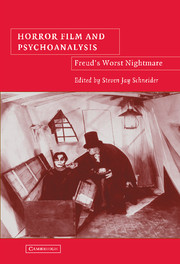Book contents
- Frontmatter
- Contents
- Acknowledgments
- Foreword: “What Lies Beneath?”
- Introduction: “Psychoanalysis in/and/of the Horror Film”
- PART ONE THE QUESTION OF HORROR-PLEASURE
- PART TWO THEORIZING THE UNCANNY
- PART THREE REPRESENTING PSYCHOANALYSIS
- 9 What Does Dr. Judd Want? Transformation, Transference, and Divided Selves in Cat People
- 10 “Ultimate Formlessness”: Cinema, Horror, and the Limits of Meaning
- 11 Freud's Worst Nightmare: Dining with Dr. Hannibal Lecter
- PART FOUR NEW DIRECTIONS
- Afterword: Psychoanalysis and the Horror Film
- About the Contributors
- Bibliography
- Index
11 - Freud's Worst Nightmare: Dining with Dr. Hannibal Lecter
Published online by Cambridge University Press: 14 July 2009
- Frontmatter
- Contents
- Acknowledgments
- Foreword: “What Lies Beneath?”
- Introduction: “Psychoanalysis in/and/of the Horror Film”
- PART ONE THE QUESTION OF HORROR-PLEASURE
- PART TWO THEORIZING THE UNCANNY
- PART THREE REPRESENTING PSYCHOANALYSIS
- 9 What Does Dr. Judd Want? Transformation, Transference, and Divided Selves in Cat People
- 10 “Ultimate Formlessness”: Cinema, Horror, and the Limits of Meaning
- 11 Freud's Worst Nightmare: Dining with Dr. Hannibal Lecter
- PART FOUR NEW DIRECTIONS
- Afterword: Psychoanalysis and the Horror Film
- About the Contributors
- Bibliography
- Index
Summary
Castration, sexual abuse, hysteria, perversity, excrement, bestiality, animal phobias – Freud's case histories read like horror movies. They are alive with fears – fear of being bitten by a horse, fear of wolves, fear of having one's bowels gnawed by a rat. His famous Interpretation of Dreams is permeated with anxieties and phobias of a similarly horrific nature – nightmares of falling, suffocation, ghosts, dead children, burning skin, urine and feces, people with bird's heads, snakes, men with hatchets, decapitations. In Freud's view, nightmares were the result of wish fulfillments from the unconscious, deadly dreamscapes of sexual origin in which he included murder and cannibalism (Freud 1975: 723–39). Samuel Goldwyn once offered Freud a lucrative contract to write a script for a movie about great lovers of history. Goldwyn could see how the screenwriter might benefit from an understanding of Freud's theories: “How much more forceful will be their creations if they know how to express genuine emotional motivation and suppressed desires” (Gay: 454). Freud refused outright. Goldwyn might have had more success if he had suggested a horror story.
Much of Freud's writings, in fact, contain the elements one might expect, not from the pen of a respectable, middle class doctor from fin de siècle Vienna, but from the laptop of contemporary masters of horror such as Stephen King or Thomas Harris. Freud's worst nightmare? How to select one dream of untold terror from such a macabre collection?
- Type
- Chapter
- Information
- Horror Film and PsychoanalysisFreud's Worst Nightmare, pp. 188 - 202Publisher: Cambridge University PressPrint publication year: 2004
- 2
- Cited by

